Could Mali Become the First African State to Fall Under al-Qaida’s Grip? What’s Happening There?
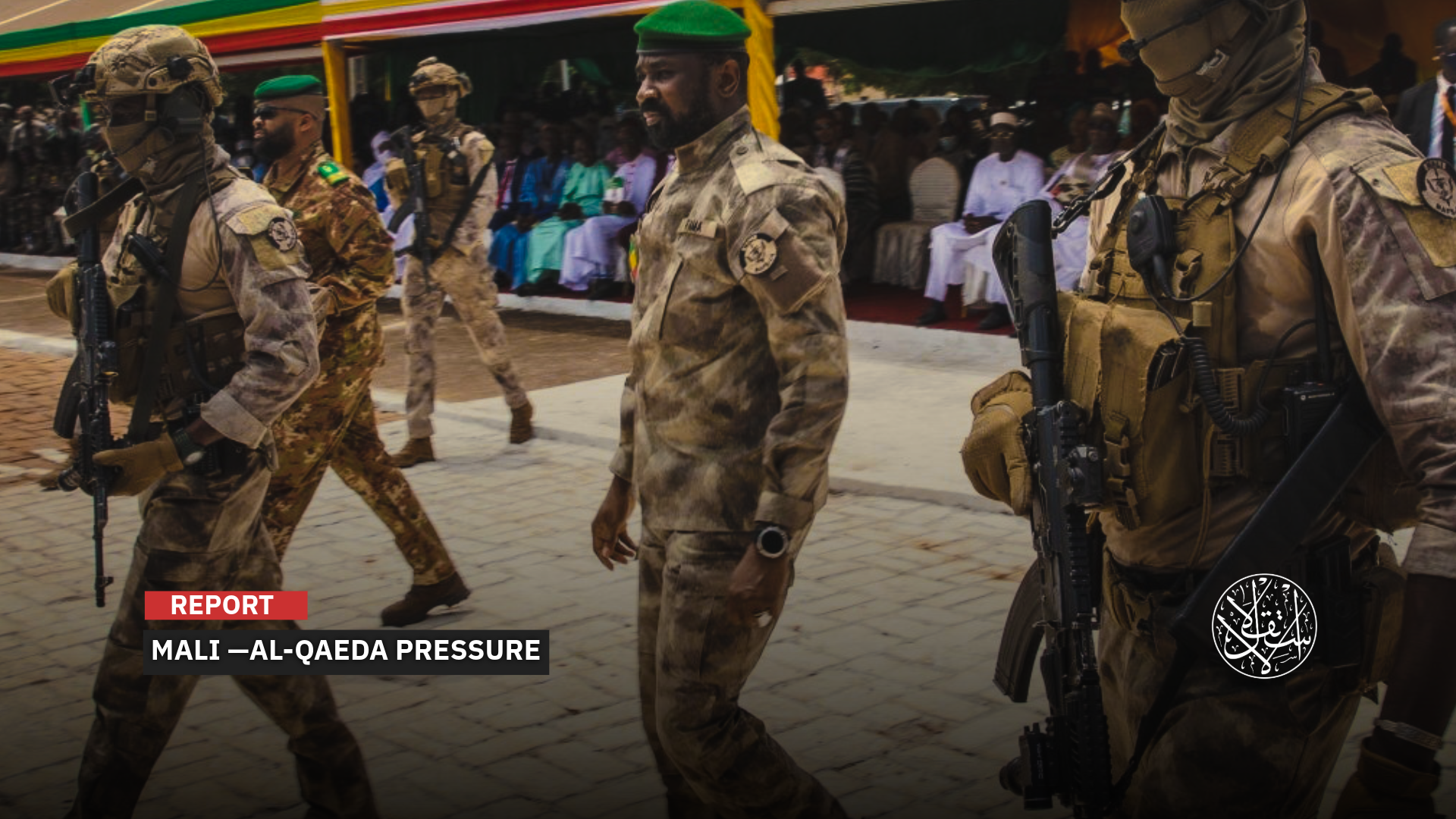
For al-Qaeda, storming Bamako would amount to 'tactical suicide,' given their lack of experience in managing an open city.
After a period of confusion and internal conflict, Western warnings have intensified over the possibility that Jama’at Nusrat al-Islam wa al-Muslimin (JNIM), affiliated with al-Qaida, is close to seizing the Malian capital, Bamako, after a months-long siege.
Western media outlets are sounding the alarm that this African country, where around 95 percent of the population is Muslim, could become the first state in Africa to fall under al-Qaida’s control, a development that could later threaten Arab countries, since Mali borders Algeria and Mauritania.
Opponents of the military government in Mali have issued appeals calling on Imam Mahmoud Dicko, who is currently in Algeria, to return and take charge of resolving the escalating political and security crisis after armed groups reached the outskirts of Bamako.
Analysts see this as an indication of how serious the situation has become, since Imam Dicko is considered one of the most influential figures in Mali, and he previously led protests against earlier governments calling for democracy, before the military seized power.
Dicko has also worked as a mediator between the Malian government and armed groups, and he is known for his extensive negotiating experience, which is why many Malians believe he is capable of pulling the country out of the deadlock it has faced during five years of military rule.
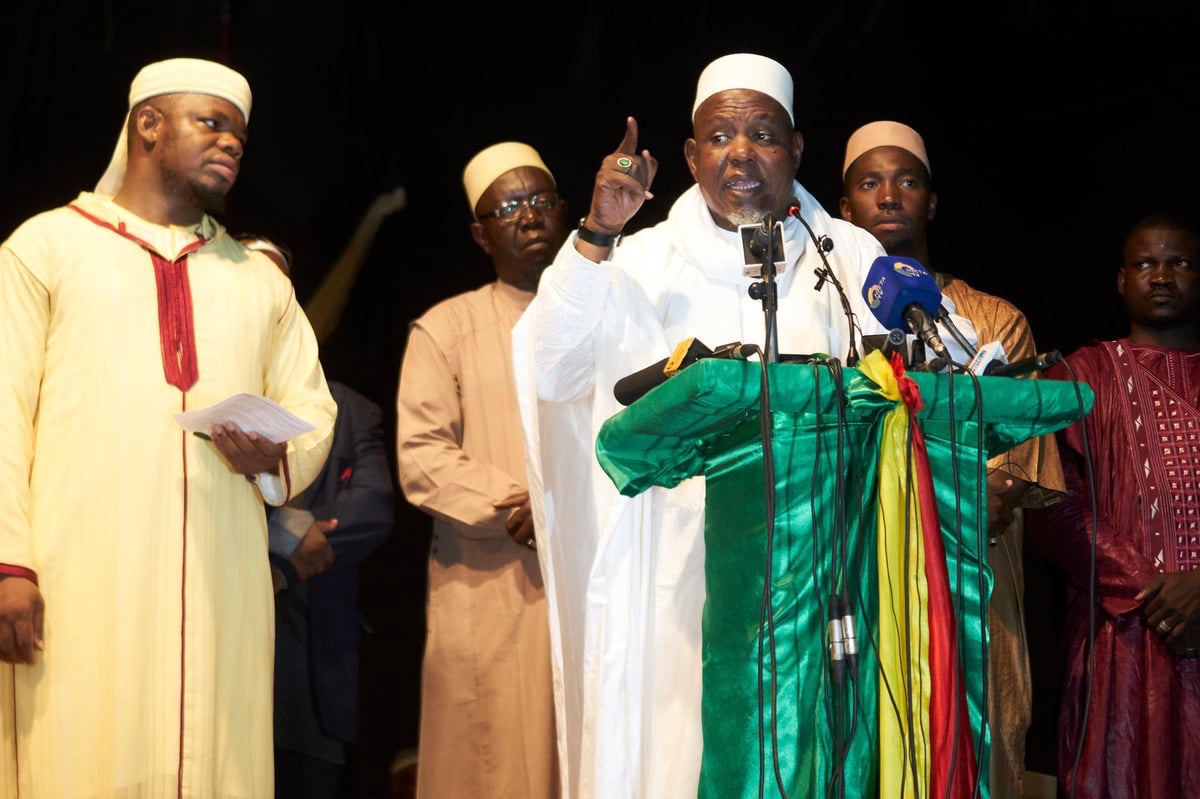
What’s New?
Since the 2020 coup in Mali, which brought a military council to power, the country has experienced persistent instability that has deepened with the expulsion of French forces and the regime’s decision to align itself with Russia as an alternative to France.
After the military ousted the late civilian president Ibrahim Boubacar Keita in 2020, divisions emerged within the ruling ranks.
In 2021, Colonel Assimi Goita carried out a second coup against the transitional president, retired Colonel Bah Ndaw, and installed himself as head of state.
In September 2025, following clashes between the army and Jama’at Nusrat al-Islam wa al-Muslimin (JNIM), al-Qaida fighters imposed an economic blockade on Bamako and prevented fuel from entering the capital.
The blockade came as a retaliatory response to the military government’s decision to ban the sale of fuel in rural areas under the group’s control, and it resulted in paralysis across the capital, a 500 percent rise in fuel prices, the closure of schools, and the cancellation of flights.
JNIM then turned what had begun as a temporary blockade into a strategy of economic pressure aimed at bringing down the regime from within by magnifying public anger and frustration, and by encouraging either an internal uprising or a military coup against General Goita.
The group seized control of the international roads linking Mali with its neighbors, routes that serve as vital lifelines for a landlocked country with no access to the sea. Among them is the Dakar–Bamako road to the west with Senegal, a crucial corridor for importing food supplies.
They also seized the Abidjan–Bamako road to the south with the Ivory Coast used for transporting fuel and goods, and the Nouakchott–Bamako route to the northwest with Mauritania, an area long used for smuggling weapons and fuel.
Iyad Ag Ghali, the leader of JNIM, took advantage of the withdrawal of French forces after a dispute with the new military rulers, and escalated the war against Bamako, seeking to capitalize on the security vacuum to strengthen his influence in Tuareg and Fulani areas.
For the first time, Ghali forged an alliance with Tuareg separatists in a joint front, despite their ideological differences. They cooperated in some battles when interests aligned, and fought each other at other moments.
Al-Qaida declares its aim of establishing an Islamic system based on sharia and a caliphate in line with its ideology, while the National Movement for the Liberation of Azawad (MNLA), a political and military group founded by Tuareg communities in northern Mali, seeks to create a secular and independent state called Azawad.
Because Imam Mahmoud Dicko, who chaired the High Islamic Council from 2008 to 2019, played a role in the political change of 2020 but later left for Algeria after disputes with the military, the opposition has called for his return to lead a new transitional phase.
They have urged his return on the grounds that he is a figure capable of unifying the population, restoring legitimacy, and negotiating with al-Qaida leaders.
General Goita had pledged to hand power back to civilians by the end of March 2024, but his transitional government announced on 25 September 2023 that the presidential election would be postponed, and the legislative elections cancelled, citing technical reasons.
Although Goita promised, after his two coups in 2020 and 2021, to bring stability, he has instead plunged the country into deeper turmoil, dismantled what remained of the state’s institutional foundations, and presided over an increasingly fractured military, according to a study published by the Atlantic Council on 31 October 2025.
For this reason, a former Malian minister living in exile told The Guardian in early November 2025 that a new coup, a third one, could occur within days, since, in his words, “the country is on the brink of a third successful coup in five year.”
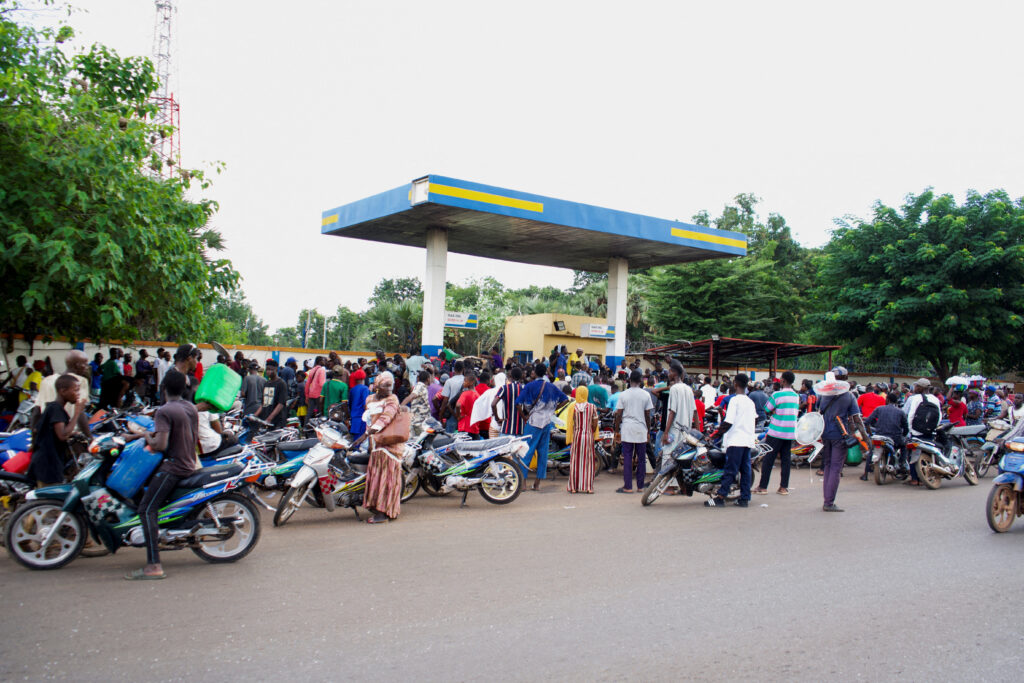
Will the Capital Fall?
Despite al-Qaida’s previous attacks on Bamako airport in 2024, including setting parts of it on fire, analysts still consider it unlikely that the group will enter the Malian capital. They cite two main reasons.
1. The group lacks a tribal and social base in Bamako, since most al-Qaida fighters come from the Fulani community, while the majority in Bamako belong to the Bambara, who reject any form of external control over them.
2. Al-Qaida’s goal is not to seize cities, but to entrench itself in mountains and expansive rural areas, and to bring down the regime through external pressure and blockade, a tactic aimed at fuelling public anger and encouraging other officers to launch a new coup.
The Malian researcher says that although Jama’at Nusrat al-Islam wa al-Muslimin has imposed a blockade on fuel supplies heading to Bamako, the siege is not fully enforced, and convoys are still passing under army protection.
In an analysis published by Taqaddum, a Kuwait-based website, he explained that the current crisis, despite its significant impact on Bamako, “does not constitute evidence of exceptional military capability that would allow the group to take control of the capital”.
He described Western expectations about the possibility of the group seizing power as “exaggerated, and more reflective of the impact of a temporary crisis than of a realistic assessment of the group’s military capabilities”.
He stressed that “the group’s real objective is not to capture Bamako, but to bring down the authorities by deepening the crises facing the regime” and by “allowing the state to erode without a battle”, potentially triggering a popular uprising against the current government.
Idris A. Rai, a researcher in African affairs, argues that the Malian regime is unlikely to collapse before JNIM, for several reasons, among them the following.
1. JNIM does not base its strategy on storming major cities like Bamako, in contrast to what happened in Afghanistan or Syria, but prefers to operate in desert regions and mountain terrain.
2. Entering Bamako would be a form of “tactical suicide”, since the group has no experience in managing large open cities or in confronting an army entrenched in the capital.
3. JNIM fighters are estimated at around 6,000, while the Malian army numbers roughly 40,000 soldiers, supported by air and ground capabilities from external partners including Turkish drones, the Russian African Corps, and undeclared cooperation with the United States, meaning the group would likely be defeated if it attempted to enter the capital.
4. There is no political or party force willing to govern alongside al-Qaida if Bamako were to fall, particularly given the group’s involvement in abuses against civilians, similar to the Rapid Support Forces militia in Sudan, which has stripped it of any moral legitimacy to convince residents that it represents a viable alternative to the government.
Malian journalist says, “The idea that terrorists could take control of Bamako is a media fantasy. The capital is protected by multi-layered defense systems, superior firepower, and large military forces supported by partners in the Sahel coalition.”
JNIM, by contrast, lacks heavy artillery, armored vehicles, and aircraft necessary to carry out a conventional attack on a city with a population exceeding two and a half million.
An analytical study by a Malian journalist, based on the examination of more than 15,000 social media posts and 387 articles about the siege of the capital, found that French media coverage heavily exaggerated the language of “collapse” by 12,000 percent.
Most of the alarmist terminology predicting an imminent end in Mali originates from Paris, he notes, reflecting France’s frustration with the current regime for expelling its forces and replacing them with Russian troops.
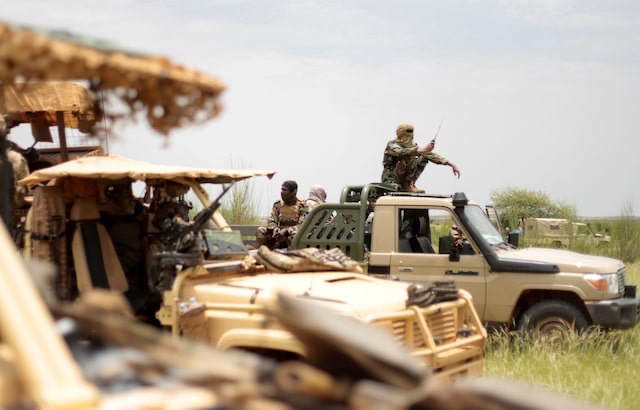
Possible Scenarios
If the situation continues to deteriorate, the armed group could seize control of vast areas and create a quasi-independent zone outside Bamako’s authority, potentially encouraging the Tuareg tribes in the Azawad region in the north of the country to pursue the establishment of their separatist state.
The Tuareg are a Muslim, nomadic people of Amazigh origin, inhabiting the vast Sahara that stretches across Libya, Algeria, Niger, Mali, and Burkina Faso.
Local populations accuse Russian Wagner mercenaries, deployed by the authorities to combat them, of committing massacres, acts of genocide, and plundering gold in the region bordering Algeria.
Tuareg fighters, however, claim to have achieved victories against these mercenaries.
Another possible scenario is international or regional intervention, African or European, to support the Malian army in repelling al-Qaida and re-establishing state authority.
A third scenario, popular among citizens, is the intervention of Imam Dicko, backed by the opposition, to compel the military council and the ruling general to adopt an economic and democratic reform plan in which the Imam would play a central role.
Calls for Imam Dicko’s intervention were issued in Bamako on November 13, 2025. These appeals circulated online among activists and opposition figures in a document titled, “Imam Mahmoud Dicko, the Man Capable of Saving Mali from the Crisis.”
The document called on the military government to make way for Imam Dicko to lead a new phase grounded in moral legitimacy and national reconciliation.
It described the military regime as “experiencing political exhaustion and a loss of direction,” following a series of unfulfilled promises on security and economic matters.
The statement warned of the military authority’s failure to contain operations carried out by armed groups such as Jama’at Nusrat al-Islam wa al-Muslimin, the National Movement for the Liberation of Azawad, and the Islamic State in the Greater Sahara.
It called for a new transition in Mali based on ethical leadership, noting that Imam Dicko, known for his positions advocating dialogue and reconciliation, enjoys popular legitimacy that qualifies him to unite Malians across religious, political, and ethnic lines.
He was described as “capable of addressing everyone, from military officers and civilians, to youth and women’s organizations, local community leaders, and even representatives of armed groups.”
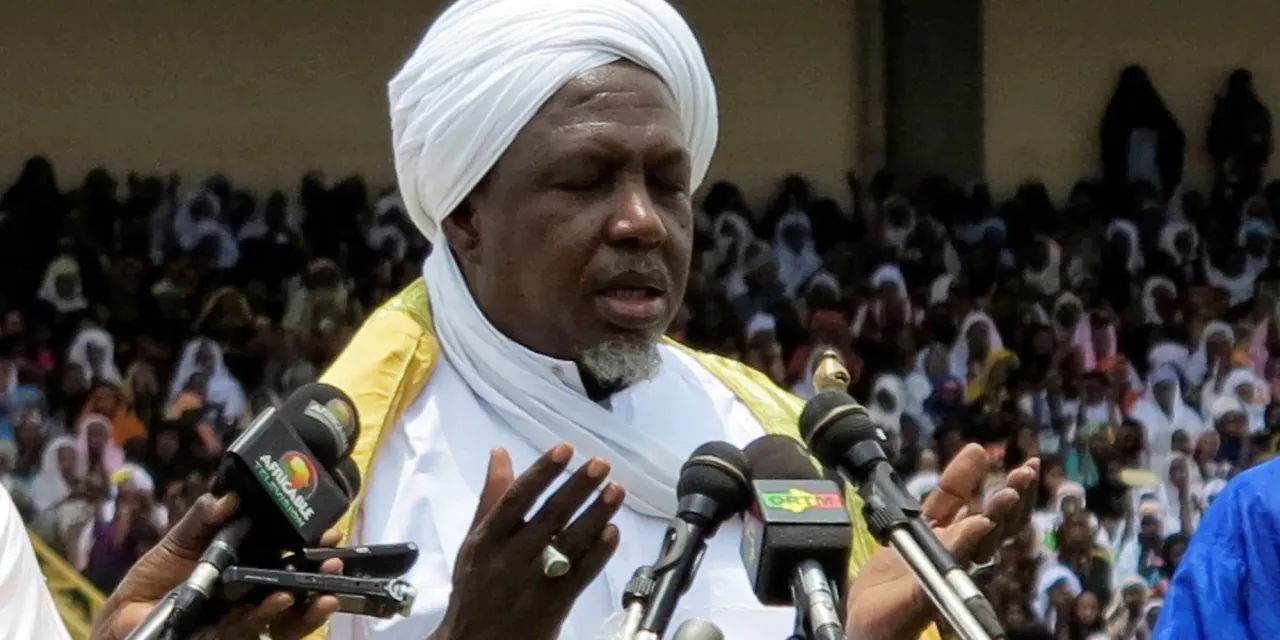
Who is Imam Dicko?
Imam Dicko gained prominence while serving as head of the High Islamic Council (2008–2019) and was involved in various political struggles, including a campaign against the family law between 2009 and 2011, as well as efforts to resolve Mali’s financial crisis from 2012 onwards.
A respected Islamic scholar, Imam Mahmoud Dicko is a leading figure in Mali’s reformist current and served as imam at one of Bamako’s most important mosques.
He also held the position of Secretary-General of the Mali Association for the Unity and Advancement of Islam, the country’s first Islamic association, founded in 1980 to promote Muslim unity, fund the construction of mosques and Quranic schools, and mediate during political and social crises.
Dicko played a role in the 2013 presidential elections, opposed the introduction of sex education into school curricula in 2019, and was involved in a range of other social issues.
He earned widespread popularity for championing causes affecting ordinary citizens at a time when trust in existing political forces had all but vanished.
Along with other Muslim scholars in Mali, he proved to be one of the few able to mobilize the public, drawing opposition party leaders to rally around him.
Imam Dicko, a prominent figure in the popular movement that ousted President Ibrahim Boubacar Keita in 2020, entered into an open dispute with the military council led by Assimi Goita after opposing what he regarded as a “departure from the democratic path” and a monopoly of power by the military.
Before the military coup in Mali on August 19, 2020, Imam Dicko was the leader of the most prominent moderate Islamic currents, opposing President Keita and calling for his removal.
Because of his leadership of the popular protests that toppled Keita and his ability to mobilize large crowds, observers at the time questioned, “Will Islamists seize power in Bamako?” according to the French magazine Le Point, August 2020.
However, contrary to Western assumptions, Imam Dicko announced his withdrawal from political life after the president’s fall and the military coup.
He did not attempt to seize power, focusing instead on advocating for moral authority free from conflict. The military, however, persecuted him, prompting his move to Algeria.
After increasing restrictions in Bamako, he left Mali at the end of 2023 for Algeria, entering self-imposed exile following a visit that sparked a serious diplomatic crisis between the two countries.
His reception by Algerian President Abdelmadjid Tebboune provoked a furious response from the Malian military council, which accused Algeria of “interfering in internal affairs” and of holding “secret meetings with figures hostile to the government.”

The Al-Qaeda Organization
The Group for the Support of Islam and Muslims, the Sahel branch of al-Qaeda, is the most active armed group in the region, according to the Armed Conflict Location & Event Data Project (ACLED) on November 23, 2023.
It was formed in 2017 through the merger of groups previously active against Malian and French forces and is estimated to number around 6,000 fighters, according to the Washington Post, citing regional and Western officials on June 8, 2025.
These groups include al-Qaeda in the Islamic Maghreb, based in Algeria, and three armed factions in Mali: Ansar al-Din, the Macina Battalion, and the Movement for Oneness and Jihad in West Africa (MUJAO).
The primary objective of the Group for the Support of Islam and Muslims is territorial control, consolidating its hold over areas under its influence and expelling Western influence, although it has not directly engaged French forces in the region.
The group is led by Iyad Ag Ghali, a Malian of Tuareg descent from the Kidal region in northern Mali, who founded Ansar Dine in 2012 with the aim of imposing its interpretation of Islamic law across Mali.
Despite al-Qaeda leaders in Mali raising slogans advocating the establishment of an Islamic caliphate and the liberation of Jerusalem, as seen in slogans such as “Al-Aqsa, we are coming,” Malians accuse the group of having carried out no military operations against the Western powers supporting the Israeli occupation.
In December 2023, Iyad Ag Ghali announced he was seeking new recruits to fight against Mali, Niger, and Burkina Faso, denouncing their governments as “apostate and infidel” and declaring his intention to establish Sharia law and an Islamic caliphate.
Notably, this declaration came at a time when these countries were striving to free themselves from French colonial influence and expel French forces from their territories.
This prompted Idriss C. Ayat, a researcher on African and Middle Eastern affairs at Kuwait University, to question why the group raises revolutionary slogans while primarily killing civilians in Mali, rather than targeting colonial powers.
“This contradiction is evidence that extremist ideological groups are pursuing hidden political agendas,” Idriss Ayat added.
There have been no major open battles directly between the Group for the Support of Islam and Muslims and French forces, despite the fact that the French mission in Mali was primarily tasked with combating al-Qaeda.











